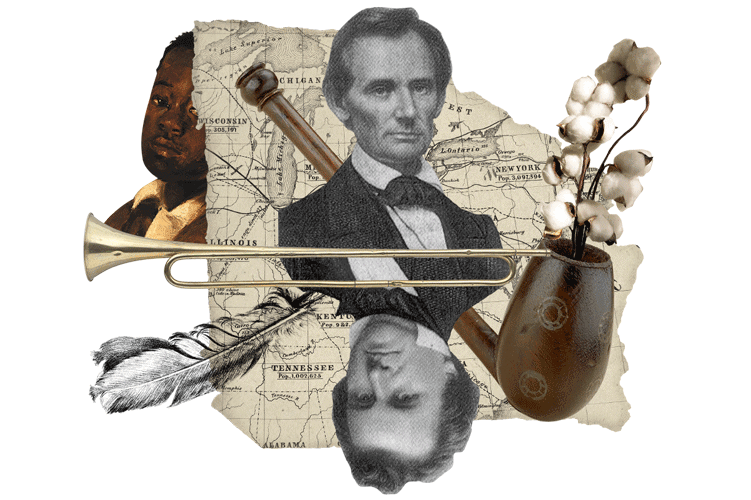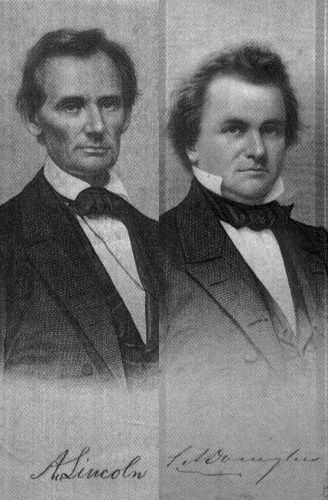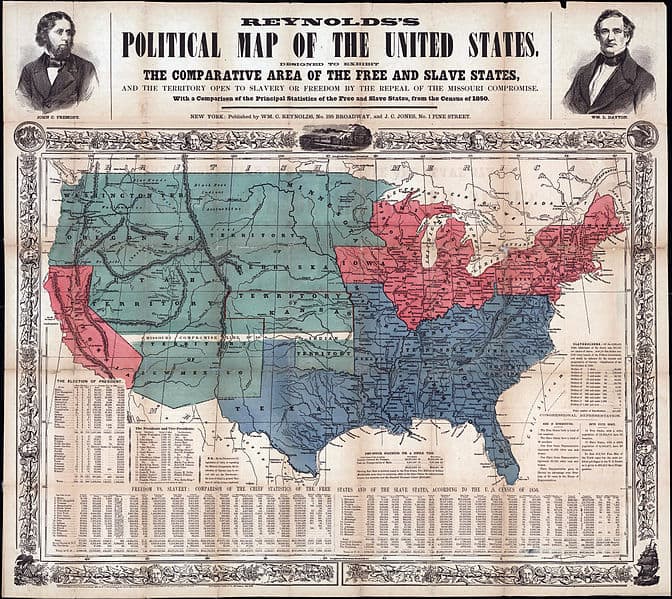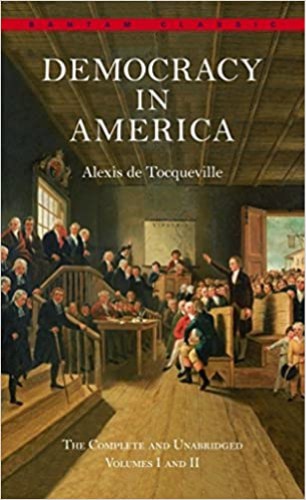We are now far into the fifth year, since a policy was initiated with the avowed object and confident promise of putting an end to the slavery agitation. Under the operation of this policy, that agitation has not only not ceased, but has constantly augmented. In my opinion it will not cease until a crisis shall have been reached and passed. ‘A house divided against itself cannot stand.’ I believe this Government cannot endure permanently half slave and half free. I do not expect the house to fall – but I do expect it will cease to be divided. It will become all one thing, or all the other.
Abraham Lincoln, Alton, Illinois, October 15, 1858

Debate 7

Rodney O. Davis and Douglas L. Wilson, eds., The Lincoln-Douglas Debates (Champaign, Illinois: University of Illinois Press, 2014). ISBN-13: 978-0252079924
The Lincoln-Douglas debate was a series of seven debates between the incumbent Stephen A. Douglas and the challenger Abraham Lincoln
The Lincoln-Douglas debate was a series of seven debates between the incumbent Stephen A. Douglas and the challenger Abraham Lincoln, taking place during the summer and fall of 1858 as they campaigned for a seat in the United States Senate. At the time, both men debated the issue regarding slavery in the United States. The matter had seemingly been settled with the Missouri Comprise in 1820. However, the United States’ victory in the U.S.-Mexican War brought new territories into the Union and reignited the slavery question. Instead of continuing the Missouri Compromise, Douglas had sponsored the Kansas-Nebraska Act, which allowed the people of a new territory to determine whether it would become a free state or slave state. The measure led to escalated violence in places like Kansas as well as the floor of the United States Senate, as Preston Brooks of South Carolina brutally caned Charles Sumner of Massachusetts.
Why This Text is Transformative?
How can a society consider itself a democracy when a portion of it cannot be treated like human beings?
Lincoln-Douglas Debate 7 highlights the problems that confronted American society on the eve of the Civil War. By 1858, issues over slavery, both the immorality of the institution as well as its possible expansion, had polarized the United States. The debates highlighted a major problem with American democracy. How can a society consider itself a democracy when a portion of it cannot be treated like human beings? Moreover, the debate illustrated the problems of individual sovereignty. The aspect that, according to Alexis de Tocqueville, provided the foundation of American democracy had, by the mid-to-late-1850s, fueled the polarization that made the American Civil War possible. In many ways, Lincoln-Douglas Debate 7 maintains relevance today as the United States is enduring increased polarization while matters of social justice and systemic racism remains prominent.
A Focused Selection
Study Questions

One 75-minute class can be used to examine the Lincoln-Douglas Debate 7 in its entirety. The discussion can look at important issues as the inevitability of the American Civil War, issues surrounding how slavery ended in the United States compared to Europe, and the overall weaknesses surrounding American democracy.
Portions of Debate 7 focused on Abraham Lincoln’s “house divided” remarks given during an earlier debate. In making these comments, he noted that “It will become all one thing, or all the other.” Lincoln’s “house divided” remarks give an air of inevitability to the American Civil War. Was the Civil War inevitable?
The question over inevitability is deceptively simple. If the Civil War was inevitable, why did it begin in April 1861 and not at an earlier moment in American history when tensions over slavery intensified? How did the government established by the Constitution keep the United States together for approximately 71 years (1789-1860)?
Stephen Douglas promoted the benefits of popular sovereignty in solving a major social issue that was tearing the United States apart. Why did Douglas believe popular sovereignty represent a solution? Why did popular sovereignty fail? What would Alexis de Tocqueville say about Douglas’s use of popular sovereignty?
Alexis de Tocqueville used Democracy in America to make comparisons between the United States and Europe. This debate is no different, as it highlighted the polarization that ultimately led to the American Civil War. Why did the United States have to fight a bloody war to abolish slavery, while Great Britain and France abolished slavery through legislative acts?
Based on the issues discussed in the Lincoln-Douglas Debate 7, how far has American society progressed since that debate took place on October 15, 1858?
Building Bridges
A Recommended Pairing

Lincoln-Douglas Debate 7 speaks well to Alexis de Tocqueville’s Democracy in America. In highlighting how the United States established a stable democracy, Tocqueville focused on individual sovereignty. This could be seen in the establishment of township governments; furthermore, individual sovereignty played a major role in American federalism. In establishing a system where local, state, and federal governments that had shared and separate powers, federalism further encouraged individual participation in government. Tocqueville, however, noted that the issue of slavery presented a threat to American democracy. These points tie into the Lincoln-Douglas Debate 7. For example, popular sovereignty became used to decide whether new American territories would become a slave state or free state, leaving the decision up to the people. This created a volatile atmosphere in places like Kansas that furthered the sectional divide that existed in the United States during the 1850s. At the same time, Lincoln-Douglas Debate 7 can speak to issues surrounding “tyranny of the majority,” focusing instead on perhaps a “tyranny of the minority,” exploring how this issue existed in the nineteenth-century United States.
Supplemental Resources
Gettysburg National Park Service 2018 Winter Lecture Series: Lincoln-Douglas Debate
Text Mapping
Discipline Mapping
History
Political Science/Government
Communication Studies
Area Studies
Page Contributor



